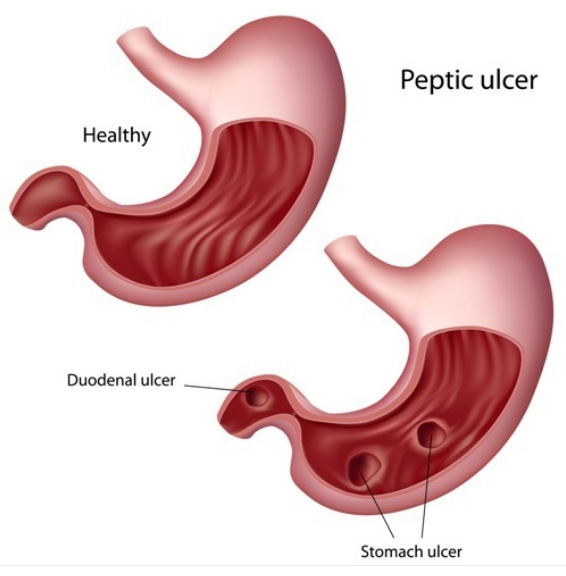Stomach ulcers or gastric ulcers are the open sores that develop on the lining of the stomach when the lining of the stomach has become damaged. This is a type of peptic ulcer that affects both the stomach and small intestines.
A thick layer of mucus protects the digestive juices in the stomach. A decline in this mucus allows the digestive acids to eat away the tissues that line the stomach, causing ulcers. A stomach ulcer is common and can be cured easily. However, If left untreated, it can turn into a more severe condition.
Symptoms of stomach ulcers
Some stomach ulcers don't show any symptoms. If present, they can include:
- Abdominal pain just below the rib cage
- Indigestion
- Nausea
- Loss of appetite
- Vomiting
- Weight loss
- Presence of blood in vomit or bowel motions
- Shock due to blood loss
What Causes Gastric Ulcers?
Gastric ulcer or stomach ulcer is usually caused when the layer protecting the stomach lining from stomach acid breaks down. This is mainly due to a bacterial infection called H. pylori.
Other major causes of gastric ulcers are:
- Excessive usage of NSAIDs – non-steroidal anti-inflammatory drugs
- Excessive Smoking
- Hypercalcemia – excessive production of calcium
- Zollinger-Ellison syndrome – a condition when the body produces excessive acid.
- unrestrained consumption of alcohol
Treatment for a stomach ulcer
Lifestyle modifications can improve the symptoms of stomach ulcers. These include:
- Losing weight(If you are overweight).
- Quitting smoking
- Quitting alcohol
- Avoid foods such as coffee, chocolate, tomatoes, fatty foods, or spicy foods.
These modifications can reduce the severity of the disease, along with other treatment methods such as:
- Medication: Different drugs, including antibiotics, to destroy the H. pylori colony, and to speed the healing process. Along with these, tablets to reduce the acid content in the gastric juices are also suggested
- Breath tests: Breath tests help to make sure that the H. pylori infection has been treated successfully and to monitor the improvement.
- Changes to existing medication: Medications for other health conditions can have effects on the ulcer. These medications are slightly altered to improve the symptoms and effects of stomach ulcers.
Most stomach ulcers will improve a few months after treatment. However, the chances of recurrence are high even after the treatment if the underlying causes are not properly addressed. If you suspect that you have stomach ulcers, talk to your doctor to discuss the appropriate treatment plan.
Visit Us : surgicalgastro.com
Reviewed by: Dr Kamalesh
Mail Us: surgicalgastrokochi@gmail.com
Book an Appointment @ surgicalgastro.com/book-appointment
Reviewed by: Dr Kamalesh
Mail Us: surgicalgastrokochi@gmail.com
Book an Appointment @ surgicalgastro.com/book-appointment







